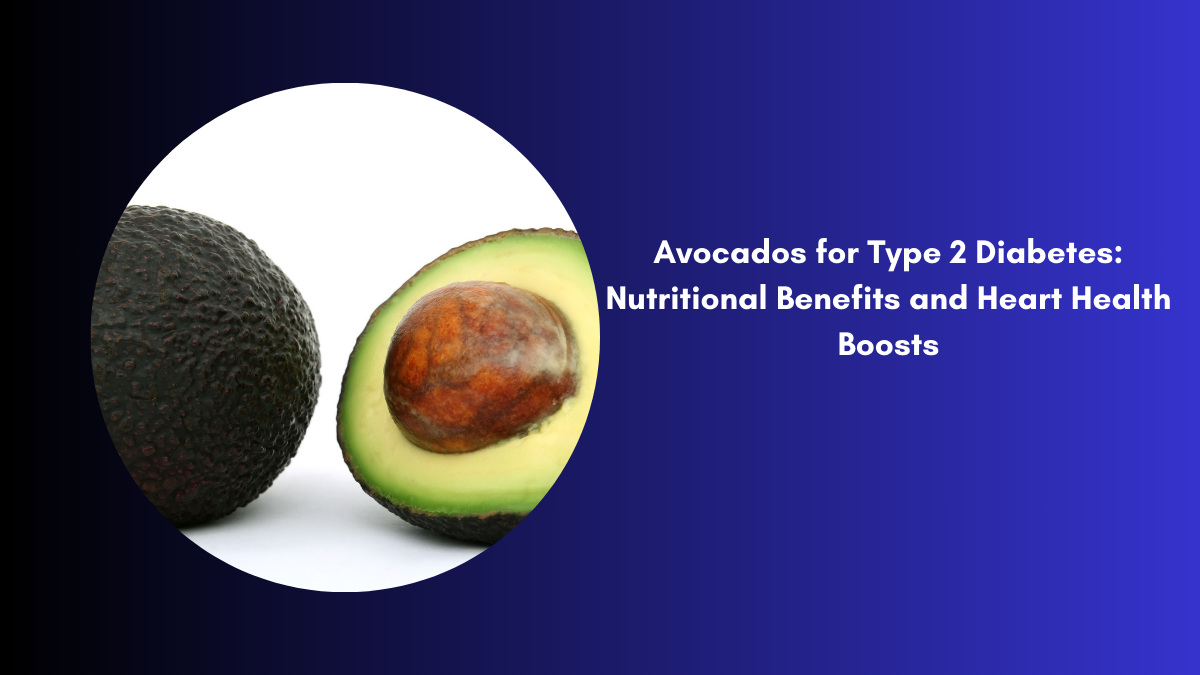The prevalence of Type 2 diabetes is rising worldwide, posing a significant risk to public health, especially due to its connection with cardiovascular disease. Managing blood sugar levels and maintaining heart health is crucial for those with diabetes. Among various natural foods, avocados stand out as a potent nutritional ally. Rich in healthy fats, fiber, and other essential nutrients, avocados offer substantial benefits in improving metabolic health and lowering the risk of diabetes-related complications.
Nutritional Profile of Avocados
Avocados are often called “nutritional powerhouses” due to their rich composition. A typical serving (about one-third to half an avocado) contains:
- Monounsaturated Fats: Avocados are rich in healthy fats, primarily oleic acid. This type of fat is known to improve insulin sensitivity, reduce inflammation, and promote a balanced cholesterol profile.
- Fiber: With about 10 grams of fiber per avocado, they contribute to better digestion, slower glucose absorption, and a feeling of fullness, reducing the risk of overeating.
- Magnesium and Potassium: These minerals are essential for blood sugar control, reducing blood pressure, and supporting cardiovascular function. Magnesium, in particular, has been linked to improved insulin sensitivity.
In comparison to other fruits, avocados are low in carbohydrates, making them especially beneficial for managing blood sugar levels.
Avocados and Blood Sugar Regulation
Stabilizing blood sugar levels is crucial for individuals with Type 2 diabetes. Avocados help in this area due to their low glycemic index and unique nutrient profile:
- Low Carbohydrate, High Fiber: Avocados contain minimal sugars and significant fiber, reducing post-meal glucose spikes and improving long-term glycemic control.
- Improved Insulin Sensitivity: The monounsaturated fats found in avocados have been shown to positively impact insulin sensitivity, which is critical for converting blood sugar into energy effectively.
- Reduced Inflammation: Chronic inflammation plays a role in the progression of diabetes. The antioxidants and anti-inflammatory compounds in avocados, such as vitamin E, help mitigate inflammation, thus promoting better metabolic health.
Practical Tip: Adding avocado to a salad or sandwich can lower the overall glycemic response of the meal, reducing potential spikes in blood sugar.
Heart Health Benefits of Avocados
For people with diabetes, heart health is a critical concern due to the heightened risk of cardiovascular diseases. Avocados provide several heart-protective benefits:
- Cholesterol Management: Research has shown that consuming avocados can lower LDL (“bad”) cholesterol while increasing HDL (“good”) cholesterol. This lipid-balancing effect helps reduce the risk of arterial plaque buildup, thereby lowering the risk of heart disease.
- Lower Blood Pressure: Potassium-rich foods, such as avocados, are known to lower blood pressure. High blood pressure is a common comorbidity with diabetes and can lead to complications like stroke or heart attacks if left unmanaged.
- Antioxidant Content: Avocados are packed with antioxidants, such as lutein and zeaxanthin, which combat oxidative stress—a factor contributing to heart disease.
Scientific Insight: Multiple studies have indicated that regular consumption of avocados, as part of a heart-healthy diet, significantly reduces markers of cardiovascular disease.
Incorporating Avocados into a Diabetes-Friendly Diet
Avocados are versatile and can be added to meals in many ways. Here are some practical suggestions for including avocados:
- Smoothies: Blend avocado with greens, berries, and a liquid base for a nutritious smoothie that balances fats, fiber, and antioxidants.
- Salads and Bowls: Dice avocado for salads or grain bowls for an added creamy texture and boost of healthy fats.
- Avocado Toast: Replace high-fat spreads with mashed avocado on whole-grain toast for a fiber-rich snack or meal.
- Guacamole: A classic choice that can serve as a dip for fresh vegetables, providing both flavor and nutritional benefits.
Portion Control Consideration: Avocados are calorie-dense. Diabetic patients are advised to limit intake to a third or half an avocado per meal to avoid excessive calorie consumption.
Scientific Evidence and Research Studies
Numerous studies have explored the impact of avocados on metabolic health. Highlights include:
- Improved A1c Levels: Some research has linked avocado consumption with lower HbA1c levels, a marker of long-term blood sugar control.
- Anti-Inflammatory Effects: Avocados reduce markers of inflammation, benefiting overall metabolic function and potentially reducing the risk of diabetic complications.
- Weight Management: Satiety-enhancing properties of avocados help with portion control and weight management, a critical factor for diabetes management.
Potential Considerations and Downsides
While avocados offer numerous benefits, they are calorie-rich, primarily due to their high fat content. It’s crucial for diabetics to monitor their intake. Additionally, those with fat malabsorption disorders should consult a healthcare professional before increasing avocado consumption.
Conclusion
Avocados are a nutrient-dense addition to a diabetes-friendly diet, offering benefits for blood sugar control and heart health. Their unique combination of healthy fats, fiber, vitamins, and minerals makes them a superfood worth considering for anyone aiming to reduce diabetes risk or manage their condition more effectively. Incorporating avocados in a balanced, mindful way can lead to lasting health benefits and improved quality of life.












